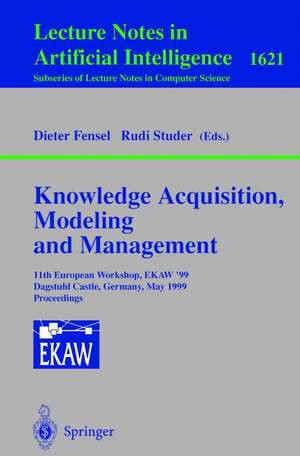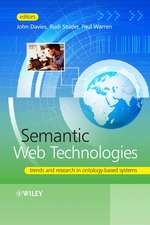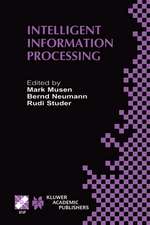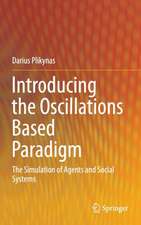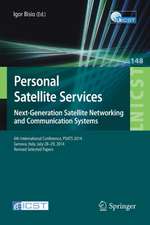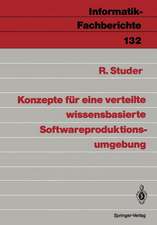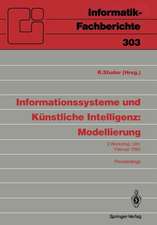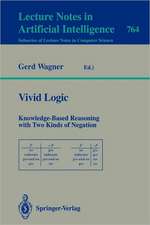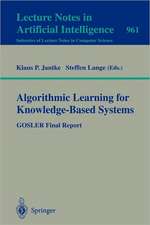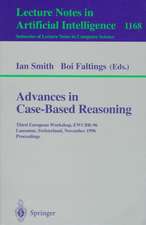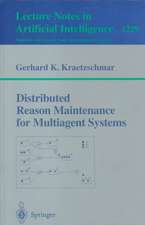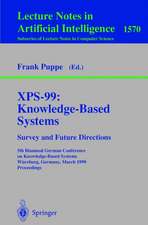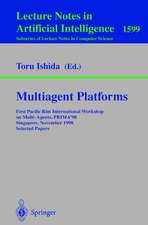Knowledge Acquisition, Modeling and Management: 11th European Workshop, EKAW'99, Dagstuhl Castle, Germany, May 26-29, 1999, Proceedings: Lecture Notes in Computer Science, cartea 1621
Editat de Rudi Studeren Limba Engleză Paperback – 19 mai 1999
Din seria Lecture Notes in Computer Science
- 20%
 Preț: 1061.55 lei
Preț: 1061.55 lei - 20%
 Preț: 307.71 lei
Preț: 307.71 lei - 20%
 Preț: 438.69 lei
Preț: 438.69 lei - 20%
 Preț: 645.28 lei
Preț: 645.28 lei -
 Preț: 410.88 lei
Preț: 410.88 lei - 15%
 Preț: 580.46 lei
Preț: 580.46 lei - 17%
 Preț: 427.22 lei
Preț: 427.22 lei - 20%
 Preț: 596.46 lei
Preț: 596.46 lei -
 Preț: 449.57 lei
Preț: 449.57 lei - 20%
 Preț: 353.50 lei
Preț: 353.50 lei - 20%
 Preț: 1414.79 lei
Preț: 1414.79 lei - 20%
 Preț: 309.90 lei
Preț: 309.90 lei - 20%
 Preț: 583.40 lei
Preț: 583.40 lei - 20%
 Preț: 1075.26 lei
Preț: 1075.26 lei - 20%
 Preț: 310.26 lei
Preț: 310.26 lei - 20%
 Preț: 655.02 lei
Preț: 655.02 lei - 20%
 Preț: 580.93 lei
Preț: 580.93 lei - 20%
 Preț: 340.32 lei
Preț: 340.32 lei - 18%
 Preț: 938.83 lei
Preț: 938.83 lei - 20%
 Preț: 591.51 lei
Preț: 591.51 lei - 15%
 Preț: 438.59 lei
Preț: 438.59 lei - 20%
 Preț: 337.00 lei
Preț: 337.00 lei -
 Preț: 389.48 lei
Preț: 389.48 lei - 20%
 Preț: 607.39 lei
Preț: 607.39 lei - 20%
 Preț: 1024.44 lei
Preț: 1024.44 lei - 20%
 Preț: 579.30 lei
Preț: 579.30 lei - 20%
 Preț: 763.23 lei
Preț: 763.23 lei - 20%
 Preț: 453.32 lei
Preț: 453.32 lei - 20%
 Preț: 575.48 lei
Preț: 575.48 lei - 20%
 Preț: 585.88 lei
Preț: 585.88 lei - 20%
 Preț: 825.93 lei
Preț: 825.93 lei - 20%
 Preț: 763.23 lei
Preț: 763.23 lei - 17%
 Preț: 360.19 lei
Preț: 360.19 lei - 20%
 Preț: 1183.14 lei
Preț: 1183.14 lei - 20%
 Preț: 340.32 lei
Preț: 340.32 lei - 20%
 Preț: 504.57 lei
Preț: 504.57 lei - 20%
 Preț: 369.12 lei
Preț: 369.12 lei - 20%
 Preț: 583.40 lei
Preț: 583.40 lei - 20%
 Preț: 343.62 lei
Preț: 343.62 lei - 20%
 Preț: 350.21 lei
Preț: 350.21 lei - 20%
 Preț: 764.89 lei
Preț: 764.89 lei - 20%
 Preț: 583.40 lei
Preț: 583.40 lei - 20%
 Preț: 649.49 lei
Preț: 649.49 lei - 20%
 Preț: 341.95 lei
Preț: 341.95 lei - 20%
 Preț: 238.01 lei
Preț: 238.01 lei - 20%
 Preț: 538.29 lei
Preț: 538.29 lei
Preț: 338.68 lei
Preț vechi: 423.35 lei
-20% Nou
Puncte Express: 508
Preț estimativ în valută:
64.81€ • 67.53$ • 53.66£
64.81€ • 67.53$ • 53.66£
Carte tipărită la comandă
Livrare economică 03-17 aprilie
Preluare comenzi: 021 569.72.76
Specificații
ISBN-13: 9783540660446
ISBN-10: 3540660445
Pagini: 424
Ilustrații: XII, 412 p.
Dimensiuni: 155 x 235 x 22 mm
Greutate: 0.59 kg
Ediția:1999
Editura: Springer Berlin, Heidelberg
Colecția Springer
Seriile Lecture Notes in Computer Science, Lecture Notes in Artificial Intelligence
Locul publicării:Berlin, Heidelberg, Germany
ISBN-10: 3540660445
Pagini: 424
Ilustrații: XII, 412 p.
Dimensiuni: 155 x 235 x 22 mm
Greutate: 0.59 kg
Ediția:1999
Editura: Springer Berlin, Heidelberg
Colecția Springer
Seriile Lecture Notes in Computer Science, Lecture Notes in Artificial Intelligence
Locul publicării:Berlin, Heidelberg, Germany
Public țintă
ResearchCuprins
Invited Papers.- Reengineering and Knowledge Management.- Knowledge Navigation in Networked Digital Libraries.- Long Papers.- Towards Brokering Problem-Solving Knowledge on the Internet.- TERMINAE: A Linguistics-Based Tool for the Building of a Domain Ontology.- Applications of Knowledge Acquisition in Experimental Software Engineering.- Acquiring and Structuring Web Content with Knowledge Level Models.- A Knowledge-Based News Server Supporting Ontology-Driven Story Enrichment and Knowledge Retrieval.- Modeling Information Sources for Information Integration.- Ontological Reengineering for Reuse.- Formally Verifying Dynamic Properties of Knowledge Based Systems.- Integration of Behavioural Requirements Specification within Knowledge Engineering.- Towards an Ontology for Substances and Related Actions.- Use of Formal Ontologies to Support Error Checking in Specifications.- The Ontologies of Semantic and Transfer Links.- Distributed Problem Solving Environment Dedicated to DNA Sequence Annotation.- Knowledge Acquisition from Multiple Experts Based on Semantics of Concepts.- Acquiring Expert Knowledge for the Design of Conceptual Information Systems.- A Constraint-Based Approach to the Description of Competence.- Short Papers.- Holism and Incremental Knowledge Acquisition.- Indexing Problem Solving Methods for Reuse.- Software Methodologies at Risk.- Knowledge acquisition of predicate argument structures from technical texts using Machine Learning: the system Asium.- An Interoperative Environment for Developing Expert Systems.- On the Use of Meaningful Names in Knowledge-Based Systems.- FMR: An Incremental Knowledge Acquisition System for Fuzzy Domains.- Applying SeSKA to Sisyphus III.- Describing Similar Control Flows for Families of Problem-Solving Methods.- Meta Knowledge for Extending Diagnostic Consultation to Critiquing Systems.- Exploitation of XML for Corporate Knowledge Management.- An Oligo-Agents System with Shared Responsibilities for Knowledge Management.- Veri-KoMoD: Verification of Knowledge Models in the Mechanical Design Field.- A Flexible Framework for Uncertain Expertise.- Elicitation of Operational Track Grids.
Caracteristici
Includes supplementary material: sn.pub/extras
